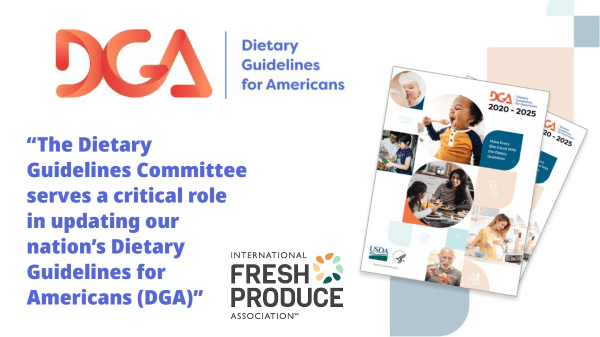Washington, DC – Today, the United States Department of Health and Human Services and the United States Department of Agriculture announced the 2025-2030 Dietary Guidelines for Americans Advisory Committee (DGAC).
The International Fresh Produce Association BB #:378962 congratulates the committee members and applauds the Departments on the selection of these highly qualified candidates.
“The Dietary Guidelines Committee serves a critical role in updating our nation’s dietary guidance, known as the Dietary Guidelines for Americans (DGA), every five years. They independently review current nutrition science and research, collaborate during meetings, assist in developing protocols to review scientific evidence, and develop a scientific report that is presented to the Departments as they develop the guidelines,” said IFPA Vice President of Nutrition and Health Mollie Van Lieu.
“In addition to providing framework for MyPlate, the guidelines have profound impact on federal nutrition assistance programs that IFPA advocates for including WIC, SNAP, USDA procurement, and school nutrition programs. Months ago, we nominated several highly qualified candidates to serve on the committee and are very pleased that all were selected.”
The following individuals were among those nominated by IFPA and selected to serve on the DGAC:
• Cheryl Anderson, PhD, MPH, MS, University of California San Diego. Dr. Anderson is a Professor and Dean of the Herbert Wertheim School of Public Health and Human Longevity Science at the University of California San Diego (UCSD). At UCSD, Dr. Anderson is the Director of the UCSD Center of Excellence in Health Promotion and Equity. She is a Fellow of the American Heart Association and is the Chair of the American Heart Association’s Nutrition Committee and Vice Chair on the council on Epidemiology and Prevention. Dr. Anderson’s research focuses on nutrition and chronic disease prevention. She is an active researcher in cardiovascular epidemiology and is the principal investigator of an NHLBI-funded study of the effects of dietary sodium and potassium intake on cardiovascular disease. She is also the principal investigator of a behavioral intervention study for adherence to current dietary sodium recommendations.
• Christopher Gardner, PhD, Stanford University. Dr. Gardner is a Professor of Medicine at Stanford University and has been conducting epidemiological and human intervention trials for 30 years. He has served on various nutrition-related committees and was co-chair on the recent American Heart Association Policy Statement on Promoting Equity through Nutrition Security. He has a strong publication background in diet and weight management and was the principal investigator and lead author of two landmark weight loss diet trials. He also has studied nutrition interventions for conditions such as diabetes.
• Valarie Blue Bird Jernigan, DrPH, MPH, Oklahoma State University. Dr. Jernigan is a Professor of Rural Health in the Center for Rural Health as well as the Executive Director of the Center for Indigenous Health Research and Policy at Oklahoma State University Center for Health Sciences. She is a public health, community-based participatory researcher with extensive training and expertise in intervention science. Dr. Jernigan is the Principal Investigator of four NIH-funded R01 studies, including “THRIVE”, a randomized trial of healthy makeovers in tribally owned convenience stores and “FRESH,” a food sovereignty and community gardening intervention with Osage Nation. Her work aims to improve indigenous food environments through policy, systems, and environmental change interventions. As an Indigenous woman and citizen of the Choctaw Nation of Oklahoma, Dr. Jernigan utilizes her lived experience to connect with the communities she works in.
Advocating for strong nutrition policies that improve and expand consumer access to fruits and vegetables remains one of IFPA’s priorities. The organization looks forward to working with the full DGAC throughout its process to ensure they have the resources needed to provide continued sound dietary guidance to consumers and government programs.
To learn more about the 2025-2030 Dietary Guidelines for Americans visit www.dietaryguidelines.gov.
About the International Fresh Produce Association (IFPA)


The International Fresh Produce Association (IFPA) is the largest and most diverse international association serving the entire fresh produce and floral supply chain and the only to seamlessly integrate world-facing advocacy and industry-facing support. We exist to bring the industry together to create a vibrant future for all. We grow our member’s prosperity by conducting advocacy; connecting people and ideas; and offering guidance that allows us all to take action with purpose and confidence. While IFPA is built on the legacy of United Fresh and Produce Marketing Association, it is not just a combination. It is transformational. Recognizing the industry required an even more powerful and unified voice, the leaders of the former United Fresh and Produce Marketing Association chose not to merge, but rather to create an entirely new organization to supersede their organizations, effective January 1, 2022.



